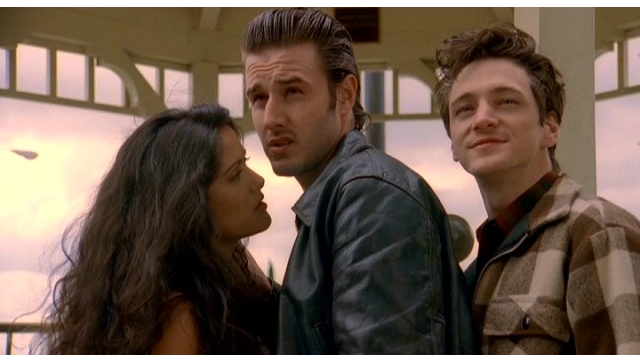In 1994, Showtime ran a series of TV movies called Rebel Highway, in which established directors were given titles of 50’s B-movies and an up-and-coming actor and told to make whatever movie they liked. Originally, Wes Craven was part of this project, but when his Nightmare On Elm Street sequel was greenlit, the project was passed to newcomer Robert Rodriguez.
The hero of the movie is Dude (David Arquette), a greaser stuck in his tiny hometown, and the movie brings that El Mariachi energy to a teenager hangout movie. There isn’t so much a plot as there are a few themes: Dude’s relationship with Donna (Salma Hayek, pulled out of obscurity), Dude’s girlfriend who encourages him to chase his dreams of making music; his rivalry with Teddy (Jason Wiles), an insecure young man pushed into bullying by his asshole cop father (William Sadler); finally, his friendship with film nerd Nixer (John Hawkes), who feels just as trapped in town as Dude but lacks the talent or meaningful way out Dude has.
Each of these threads allows some element of Rodriguez’ particular talent and personality to come to come to the fore. Just like El Mariachi, Dude is a wannabe guitar player with a clear talent, but this time it’s front and center in the action – playing music itself is a moral quandry, because Dude is conflicted over ‘selling out’, wanting to make music that ‘scares people’. Donna argues for a stable job that can support them both, and finds his refusal to commit to something frustrating; this is all a very Rodriguez preoccupation.
(This isn’t even going into the fact that Donna is an adopted Mexican girl, letting the movie explore small-town racism.)
Dude’s rivalry with Teddy, meanwhile, lets Rodriguez indulge in his love of action, with spectacular car chases, fire effects, standoffs, and that final violent half hour. What’s great is that the choice of genre forces Rodriguez out of some bad habits – it being a small-town greaser film, he can’t immediately kill people off, and consequently this movie has a deeper, more nuanced focus on a few characters, lending it greater emotional weight.
Which might be a result of the third, most underrated quality of Rodriguez. This film was co-written with Tommy Nix, and Hawks’ character Nixer was based heavily on him. What defines Rodriguez’ better movies and damns his worse ones is his absolute trust in his collaborators, letting their contributions in completely undigested, and Nix contributes both another viewpoint and a sincere emotional core.
Ultimately, the reason this movie is so successful is because underneath the setpieces, genre elements, and Mariachi filmmaking is a familiar feeling: being a teenager with a few cool friends in a boring small town, dreaming of something bigger. Arquette as Dude has a swagger that screams “trying way too hard”, but rather than undermining coolness, it conveys a sincere insecure desire under a teenager’s exterior, and as the movie approaches its bloody climax, the characters get philosophical in that way only teenagers with less life experience than they realise do. It’s a surprisingly big emotion for a Rodriguez TV movie knocked out in a fortnight.

